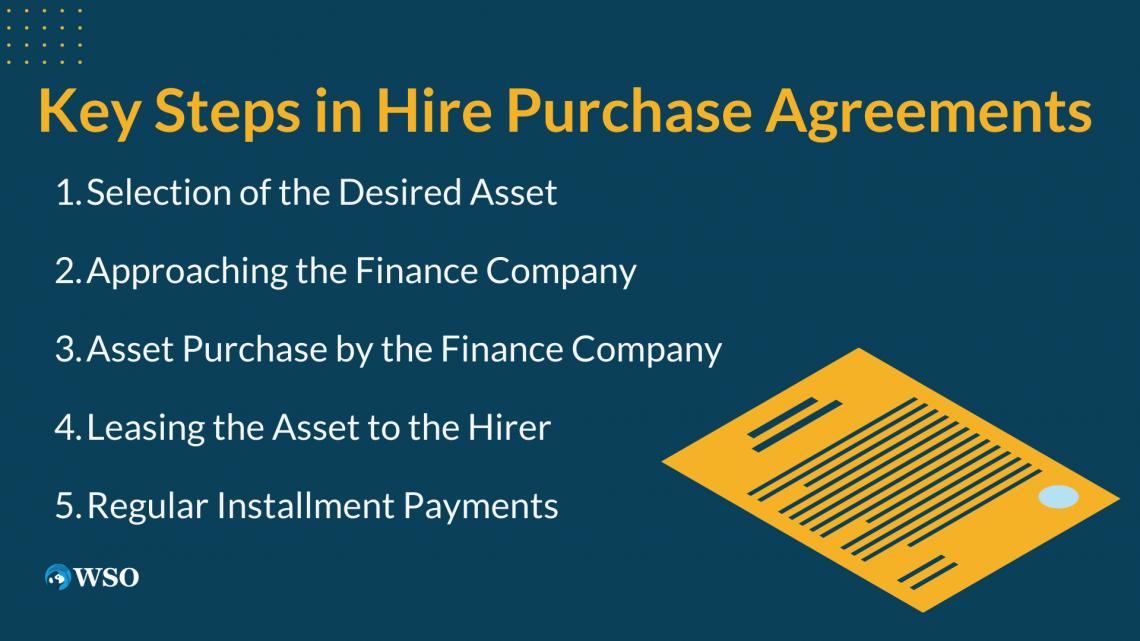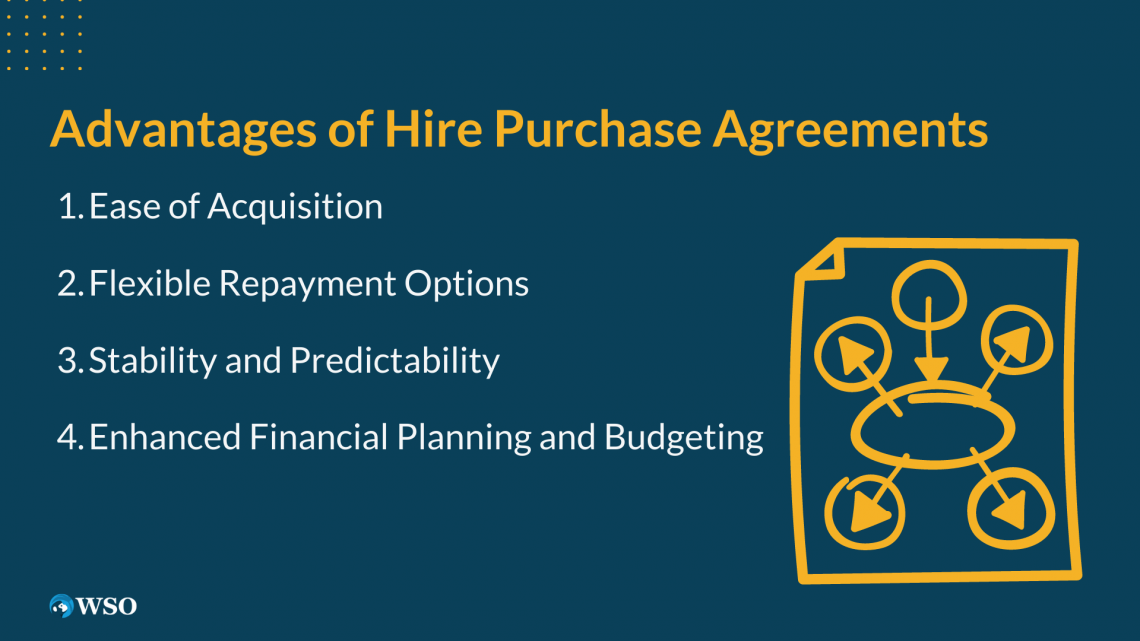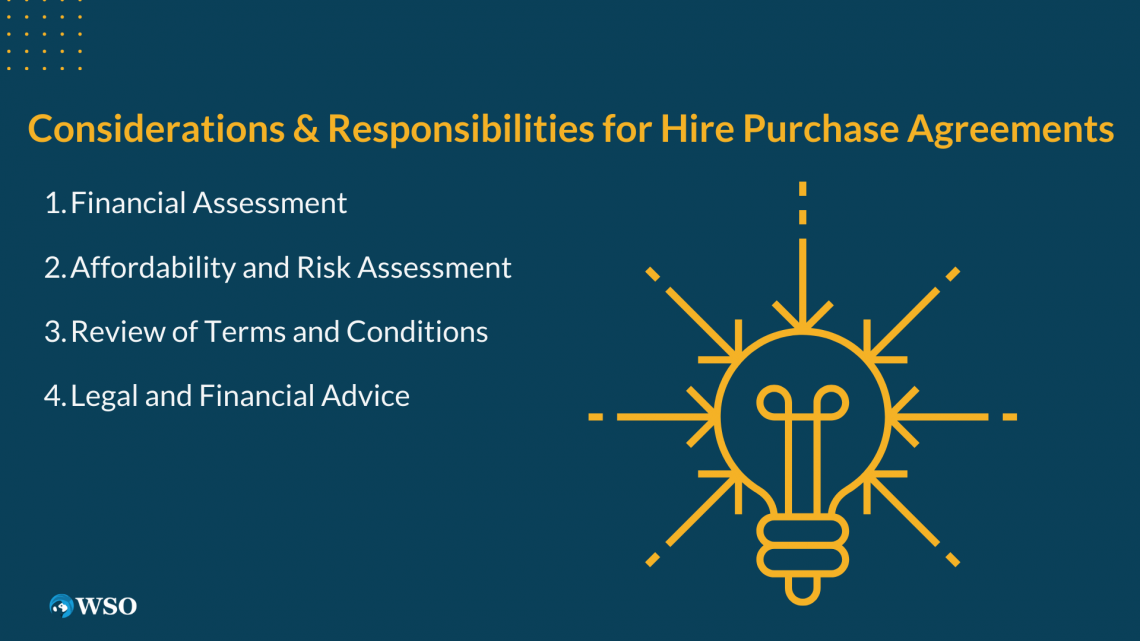Hire Purchase Agreements
It offer a flexible and accessible financing option for individuals and businesses to acquire assets without substantial upfront payments.
What Is a Hire Purchase Agreement?
Within financial transactions, one commonly encountered arrangement by individuals and businesses alike is the Hire Purchase Agreement.

This particular contractual agreement allows customers to acquire assets of their choice while deferring payment through a structured installment plan spread over an agreed-upon period.
The allure of Hire Purchase Agreements lies in providing a flexible and accessible financing option, allowing individuals and businesses to obtain essential assets without the burden of immediate and substantial upfront payments.
Customers are granted the privilege of selecting their desired assets, which can range from personal vehicles to industrial machinery, and proceed to obtain them through a structured installment plan.
Unlike traditional methods that necessitate an immediate lump sum or down payment, this arrangement permits individuals and businesses to distribute the cost over an extended period, facilitating better financial planning and reducing the risk of financial strain.

As a result, these agreements cater to a broader demographic, encompassing individuals with diverse income levels and businesses across various sectors, thereby promoting inclusivity and economic growth.
The following sections will delve deeper into the mechanics, advantages, and considerations of this financing option, offering invaluable insights to empower readers to make informed financial decisions.
Key Takeaways
- Hire Purchase Agreements offer a flexible and accessible financing option, allowing individuals and businesses to acquire assets without substantial upfront payments.
- By spreading the asset's cost over time, Hire Purchase Agreements make asset acquisition more affordable and manageable.
- These agreements provide immediate access to desired assets and enable effective cash flow management through structured installment payments.
- Fixed interest rates in Hire Purchase Agreements offer stability and predictability in financial obligations, facilitating better financial planning and budgeting.
- Before entering into a Hire Purchase Agreement, hirers should evaluate their financial situation, assess affordability, and thoroughly review the terms and conditions to make informed decisions and fulfill their responsibilities.
Understanding Hire Purchase Agreements
This financial arrangement empowers the hirer to enjoy the immediate use of a desired asset while spreading the acquisition cost across a series of manageable installments over a specified period.

These agreements hold significant value for individuals and businesses alike as they provide an avenue to obtain valuable assets such as vehicles, machinery, or equipment without the need for a substantial upfront payment.
The following points will provide you with an overview of a typical Hire Purchase Agreement.
Key Elements of Hire Purchase Agreements
At its core, this Purchase Agreement encompasses several key elements that define the nature of the transaction. First and foremost, the agreement outlines the identification of the asset being acquired through the arrangement.
By clearly outlining these elements, Hire Purchase Agreements establish a foundation for a transparent and mutually beneficial financial relationship between the hirer and the owner.
Advantages of Hire Purchase Agreements
Hire Purchase Agreements offer a range of advantages that make them an attractive financing option for both individuals and businesses.
Firstly, these agreements provide immediate access to the desired asset, allowing the hirer to utilize it for personal or commercial purposes without delay.
Secondly, structured installment payments enable individuals and businesses to manage their cash flow more effectively by distributing the asset's cost over time.
By avoiding a large upfront payment, hirers can preserve their working capital and allocate resources to other critical areas of their personal or business finances.
Considerations for Hirers
While an agreement can offer numerous benefits, hirers should consider certain factors before entering into such arrangements.
Hirers should assess their financial capabilities to ensure that borrowers can comfortably meet the installment obligations throughout the agreement.
With the ability to obtain valuable assets through manageable installments, hirers can overcome the barriers posed by upfront costs and embark on their desired personal or business ventures.
Note
By understanding the dynamics of Hire Purchase Agreements and making informed decisions, individuals and businesses can leverage this financing option to unlock opportunities and achieve their aspirations.
Key Steps in Hire Purchase Agreements
Hire Purchase Agreements involve multiple parties and a systematic procedure that allows hirers to acquire assets through installment payments.

We will now cover some of the important milestones in this process:
1. Selection of the Desired Asset
The hirer initiates the process by carefully selecting and identifying the asset they wish to acquire. They consider various factors, including the purpose of the asset, its specifications, and its estimated lifespan.
Additionally, the hirer evaluates the asset's market value, resale potential, and any associated maintenance or operating costs.
During this stage, the hirer may seek expert advice or conduct market research to make an informed decision. They compare different options, assess their financial capacity, and determine if the chosen asset aligns with their long-term objectives.
Moreover, hirers may also consider the asset's depreciation rate, technological advancements in the industry, and the potential for obsolescence.
Note
This comprehensive analysis ensures that the selected asset meets their specific requirements and maximizes the value they derive from the agreement.
2. Approaching the Finance Company
Once the hirer has identified the desired asset, they approach a finance company specializing in these agreements.
The finance company carefully evaluates the hirer's eligibility for the agreement. They assess factors such as the hirer's creditworthiness, financial stability, and ability to make regular installment payments.
Note
The finance company may also consider the nature and value of the asset being acquired.
During this evaluation process, the finance company may conduct background checks, verify financial information, and assess the hirer's overall suitability for the agreement.
They aim to ensure that the hirer has the financial capacity and commitment to fulfill their obligations throughout the agreement's duration.
Upon successful evaluation, the finance company may provide the hirer with pre-approval or conditional approval for the agreement.
This signifies that the hirer meets the necessary criteria and is eligible to proceed with the agreement, subject to finalizing the terms and conditions.
3. Asset Purchase by the Finance Company
If the hirer's application is approved, the finance company takes the responsibility of purchasing the chosen asset from the owner.
This step involves the finance company negotiating the purchase price and finalizing the transaction with the owner or seller.
It is crucial for the finance company to accurately document and register the asset's ownership under their name. This step provides legal protection and establishes their rights as the asset owner in case of any disputes or default situations.
The finance company may also secure insurance for the asset to protect against damage, loss, or other unforeseen circumstances. This ensures that the asset's value is adequately safeguarded throughout the agreement period.
By taking ownership of the asset, the finance company assumes the responsibility of maintaining its value and ensuring its usability for the hirer. They are also responsible for complying with the asset's legal obligations or maintenance requirements.
Note
The asset purchase by the finance company is a critical step in the process.
It establishes the legal framework for the agreement and ensures that the asset is acquired in a transparent and compliant manner, providing both the hirer and the finance company with peace of mind and protection.
4. Leasing the Asset to the Hirer
Once the finance company has purchased the asset, leasing the asset to the hirer is the next step in this purchase agreement. This stage involves the finance company granting the hirer the right to use and enjoy the benefits of the asset throughout the agreement period.
The lease agreement outlines the terms and conditions of the hirer's use of the asset. It specifies the duration of the lease, any usage restrictions, and the responsibilities of both parties regarding maintenance and insurance.
Note
It is important for the hirer to fulfill their obligations under the lease agreement. They must make regular payments to the finance company as specified in the agreement.
The lease agreement may also include provisions for the hirer to have the option of purchasing the asset at the end of the agreement period. This allows the hirer to own the asset eventually, provided they fulfill certain conditions and make any required additional payments.
Leasing the asset to the hirer allows them to benefit from the asset's use without requiring a significant upfront investment. It provides them with the necessary flexibility to utilize the asset while preserving their cash flow for other business or personal expenses.
5. Regular Installment Payments
The hirer is responsible for making regular installment payments to the finance company over the agreed-upon period. These payments encompass the asset's cost and any associated interest or fees.
The installment amount is predetermined and typically remains fixed throughout the agreement, facilitating predictable budgeting and financial planning for the hirer.
Note
By making regular payments, the hirer gradually reduces their outstanding balance and eventually gains full ownership of the asset upon completion of the agreement.
Understanding these key steps is essential for both hirers and finance companies to navigate the agreement successfully.
Advantages of Hire Purchase Agreements
Hire Purchase Agreements offer numerous benefits, including ease of acquisition, flexible repayment options, and fixed interest rates.

Let us explore the advantages of this financing arrangement and understand how it can benefit individuals and businesses. The advantages are:
1. Ease of Acquisition
One of the primary advantages of this Purchase Agreement is the ease of acquiring valuable assets.
Unlike traditional methods that often require substantial upfront payments, these agreements allow individuals and businesses to spread the asset's cost over an agreed-upon period.
This flexibility in payment provides accessibility to assets that may have otherwise been financially burdensome to acquire outright. It allows hirers to obtain the assets they need without depleting their cash reserves or disrupting their cash flow.
By offering ease of acquisition, Hire Purchase Agreements empower hirers to obtain essential assets while maintaining their financial stability and preserving their liquidity for other operational or investment needs.
2. Flexible Repayment Options
Hire Purchase Agreements offer flexibility in terms of repayment options. Hirers have the opportunity to customize the installment structure according to their financial capabilities and preferences.
Note
This flexibility ensures that the repayment plan aligns with their cash flow, allowing for smoother financial management and reduced strain on their budget.
3. Stability and Predictability
Another significant advantage of Hire Purchase Agreements is the inclusion of fixed interest rates. With fixed interest rates, hirers can enjoy stability and predictability in their financial obligations.
Unlike variable interest rates that fluctuate with market conditions, fixed rates remain constant throughout the agreement period. This allows hirers to plan their finances more effectively, as they can anticipate the exact amount they must pay during each installment period.
4. Enhanced Financial Planning and Budgeting
The stability and predictability offered by fixed interest rates contribute to enhanced financial planning and budgeting.
Hirers can accurately forecast their future financial commitments, making allocating funds easier and meeting other essential expenses. The ability to plan ahead fosters better financial control and reduces the risk of unexpected financial burdens.
Such agreements provide several advantages, making them a desirable financing option for individuals and businesses. The ease of acquisition, flexible repayment options, and inclusion of fixed interest rates contribute to a more accessible and manageable asset acquisition process.
Note
With Hire Purchase Agreements, individuals and businesses can acquire valuable assets while maintaining stability and control over their financial obligations.
Considerations and Responsibilities for Hire Purchase Agreements
Before entering into this Purchase Agreement, it is crucial for hirers to evaluate their financial situation, assess affordability, and understand the terms and conditions.

The key considerations and responsibilities that hirers should consider when entering into this kind of Purchase Agreement are explained below.
Financial Assessment
Before committing, hirers should conduct a thorough financial assessment. This involves evaluating their income, expenses, and existing financial obligations.
It is essential to determine whether the monthly installment payments fit within their budget and whether they have sufficient cash flow to meet the repayment requirements.
Hirers should also consider any potential changes in their financial circumstances that may affect their ability to make timely payments.
Affordability and Risk Assessment
Affordability is a crucial factor to consider. Hirers should carefully evaluate whether they can comfortably afford the monthly installments without straining their finances or jeopardizing other essential expenses.
It is important to consider the overall financial stability and ensure the agreement aligns with their long-term financial goals.
Note
Assessing potential risks, such as job security or unexpected financial emergencies, is also vital to ensure the ability to meet the repayment obligations throughout the agreement period.
Review of Terms and Conditions
Hirers should thoroughly review the terms and conditions of the Hire Purchase Agreement before signing. This includes understanding clauses related to early termination, maintenance responsibilities, and insurance coverage.
Early termination clauses outline the consequences and potential fees associated with ending the agreement before the agreed-upon term. Maintenance responsibilities detail the hirer's obligations to maintain and repair the asset during the agreement period.
Insurance coverage clauses specify the required insurance policies and their coverage limits, protecting both the hirer and the owner in case of unforeseen events.
Legal and Financial Advice
Seeking legal and financial advice is highly recommended before entering into a Hire Purchase Agreement.
Professionals in these fields can provide valuable insights and ensure that the hirer fully understands the legal implications, financial commitments, and rights associated with the agreement.
Their expertise can help identify any potential pitfalls or hidden clauses that may impact the hirer's financial position.
Before entering into an agreement, hirers must remember several considerations and responsibilities.
Conducting a thorough financial assessment, evaluating affordability and risks, reviewing the terms and conditions, and seeking professional advice are crucial steps to make an informed decision.
Note
By carefully considering these factors, hirers can confidently enter into a Hire Purchase Agreement, knowing that they have taken the necessary precautions and are well-prepared for their financial responsibilities.
Conclusion
Hire Purchase Agreements provide individuals and businesses with a flexible and accessible financing option, enabling them to obtain valuable assets without needing immediate, substantial upfront payments.

The mechanics of these agreements involve a contractual arrangement between the hirer, the owner, and a finance company acting as an intermediary.
The hirer selects the desired asset, and if approved for financing, the finance company purchases the asset and leases it to the hirer, who becomes the rightful user during the agreement period.
One of the primary advantages provided is the ease of acquisition. By spreading the asset's cost over time, hirers can make it more affordable and manageable, avoiding the burden of large upfront payments.
Additionally, the flexibility in repayment options allows hirers to tailor the installment structure to their financial capabilities, providing further convenience and adaptability.
Moreover, these agreements often come with fixed interest rates, offering stability and predictability in financial obligations.

Hirers should evaluate the affordability of the monthly installments, considering any potential risks or changes in circumstances that may impact their repayment capability.
Reviewing the terms and conditions, including clauses related to early termination, maintenance responsibilities, and insurance coverage, is essential to ensure a clear understanding of the agreement.
They offer a valuable avenue for individuals and businesses to acquire necessary assets while managing their cash flow effectively.
By understanding the mechanics, advantages, and considerations associated with these agreements, hirers can make informed decisions that align with their financial goals and needs.
Whether it is a personal vehicle or essential equipment for business operations, Hire Purchase Agreements provide a viable pathway toward asset ownership without high upfront costs, contributing to financial flexibility and growth.




or Want to Sign up with your social account?